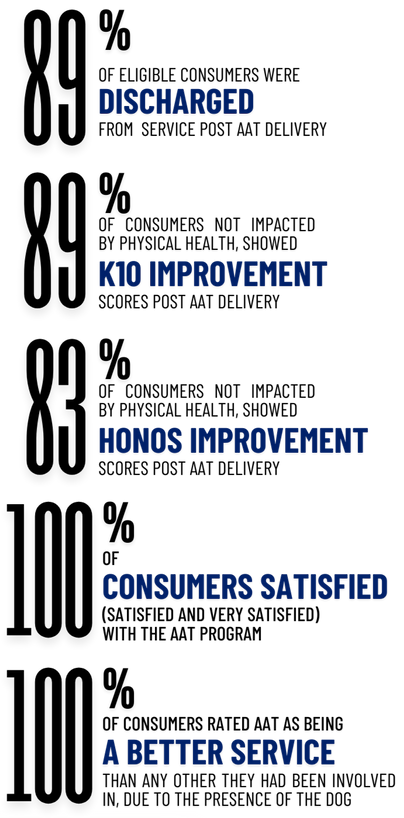PROGRAMS
Delta C-AAT Pilot
Program Outcomes
Delta Therapy Dogs partnered with the HNE LHD Older Persons Mental Health service to deliver a successful 18-month canine assisted psychotherapy pilot program, with some remarkable outcomes for the consumers, clinicians and the service.

Mental health services are not routinely available to older people living in Residential Aged Care Homes (RACH) and are not within scope of the personal care or accommodation services RACHs provide. On the other hand there is evidence that RACH residents have very high rates of common mental illness. As such Primary Health Networks (PHNs) are required by the Department of Health to commission psychological treatments services targeting mental health needs of people living in RACHs.
In 2021 Delta Therapy Dogs was invited to, and successful in tendering for, funding under the Primary Mental Health Care for Residential Aged Care Facilities and COVID-19 Mental Health In-reach Service and Support for older Australian Initiative, though the Hunter New England Central Coast (HNECC) PHN, to develop an innovative Animal Assisted Therapy (AAT) model that could increase the availability, scalability and sustainability of AAT services in the region.
The purpose of the pilot program was to:
-
increase the number of people accessing mental health supports in RACHs;
-
support people transitioning into RACHs;
-
increase the awareness of AAT within mental health and RACH settings; and
-
support mental health clinicians to integrate AAT into their practice...
with the aim of:
-
reducing the prevalence of mental illness in RACHs;
-
increasing early intervention and prevention of the need for more intensive clinical supports; and
-
improving the experience of consumers living with mental illness, their families and carers.

The initial stage of the pilot involved an 18-month collaboration with national and international subject-matter experts to develop a collaborative model of AAT - whereby a mental health clinician works in partnership with a therapy dog handler and their dog, to deliver one-on-one or group psychotherapy interventions. Delta Therapy Dogs collaborated with personnel from the University of Denver’s Graduate School of Social Work’s Institute for Human-Animal Connection to develop the C-AAT program, as well as other remarkable US and Australian-based industry experts.
Delta was lucky enough to partner with the Hunter New England (HNE) Local Health District (LHD) Older Persons Mental Health (OPMH) service to implement this Collaborative Animal Assisted Therapy (C-AAT) pilot program to consumers in their service who were identified as requiring more innovative solutions to accelerate their recovery journey. The OPMH service provide public specialist mental health clinical care to people with moderate to severe mental health concerns, aged 65 years and over, and Aboriginal people 50 years and over. Services are provided in the community, at home, in residential aged care, and in hospital, and delivered by a range of health professionals.
Pilot Outcomes

RAPPORT BUILDING between the recipient and clinician was often made easier with the presence of a therapy dog, as the dog created a safe space for the program recipient. One clinician commented:
"This form of therapy quickly enabled trust to be built up between the client and the clinician... I probably wouldn't have gotten in the door without the therapy dog".
The human-animal bond supported RELATIONSHIP BUILDING, not only with the treating team, but with others such as staff, residents, and family members. In one example, the recipient - initially seeking a water bowl for the therapy dog - led to an improved relationship between them and a staff member, which has continued beyond the life of the program. In another example, a program recipient reconnected with a family member via Facetime and Facebook as the program recipient was excited to show off the therapy dog, saying:
"My eyes lit up when I saw him, he's a lovely dog".
The program recipients were often MOTIVATED by the dog’s visit - often getting out of bed and dressed, ready to receive them. This led to improved engagement in the therapy itself. One clinician commented:
"The program brings so much joy that clients have not felt for some time and gives them motivation to pursue goals they have developed with our service... AAT enables clients to stay engaged with our service which can be an issue for some of our clients".
Program recipient MOOD WAS LIFTED during the sessions – program beneficiaries felt special that the therapy dog was visiting only them, and this feeling often extended past the session itself, helping the program recipient to feel more confident in to the future. One recipient commented:
"I feel more self-confident and more energy for tasks I set myself".
With the Delta volunteer also noting:
"She was easily directed away from dwelling on her negative dialogue and was obliging in the suggestions made by us. She visibly looked so much better by the end of the visit".
The dog was a CALMING INFLUENCE on program recipients, many of whom enjoyed just sitting and patting the therapy dogs. One program recipient commented, when asked if there was anything the program could have improved on:
"There is only the strong feeling I have that the feeling of comfort came with the help of the dog - very good comfort".
The dog was able to act as a metaphor for the consumers own experience which helped with MEANING-MAKING. This created a safe space for program recipients to better understand and make sense of their situation or self.
